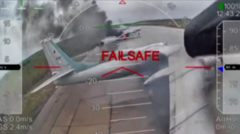Trump's comments suggest a complicated dynamic as both leaders navigate contrasting narratives and objectives.
**Trump and Putin Discuss Retaliation Amid Ongoing Tensions in Ukraine**

**Trump and Putin Discuss Retaliation Amid Ongoing Tensions in Ukraine**
In a recent phone call, President Trump and President Putin addressed the escalation of conflict in Ukraine following a drone attack.
In a significant phone call yesterday, U.S. President Donald Trump revealed that Russian President Vladimir Putin plans to retaliate against Ukraine in response to a major drone strike carried out over the weekend. Trump characterized the conversation as constructive but cautioned that it would not lead to immediate peace. He did not clarify whether he attempted to dissuade Putin from further military actions against Ukraine.
During a meeting in Russia, President Putin predominantly focused on attacks he alleges were perpetrated by Ukraine, notably railway strikes that resulted in seven fatalities. He maintained that these actions were intentionally designed to undermine ongoing peace negotiations. Conversely, Ukrainian President Volodymyr Zelensky accused Putin of stalling talks to delay the imposition of new sanctions from the United States.
The backdrop of these discussions reveals a broader context, as despite Ukraine's recent attacks, Russia remains aggressive in its operations within Ukraine, making advances on the battlefield and launching drone and missile strikes on civilian targets.
On a separate topic, Trump mentioned he had solicited Putin's assistance in achieving a nuclear deal with Iran, asserting that both leaders agreed that the nation should not acquire nuclear weapons.
Meanwhile, European countries express growing confidence in their ability to support Ukraine in the event that Trump retreats from involvement in the conflict. The rise of drone warfare in both Ukraine and Russia signifies a transformative shift in modern conflicts, highlighting the lack of preparedness among Western nations to engage in this new military landscape.
During a meeting in Russia, President Putin predominantly focused on attacks he alleges were perpetrated by Ukraine, notably railway strikes that resulted in seven fatalities. He maintained that these actions were intentionally designed to undermine ongoing peace negotiations. Conversely, Ukrainian President Volodymyr Zelensky accused Putin of stalling talks to delay the imposition of new sanctions from the United States.
The backdrop of these discussions reveals a broader context, as despite Ukraine's recent attacks, Russia remains aggressive in its operations within Ukraine, making advances on the battlefield and launching drone and missile strikes on civilian targets.
On a separate topic, Trump mentioned he had solicited Putin's assistance in achieving a nuclear deal with Iran, asserting that both leaders agreed that the nation should not acquire nuclear weapons.
Meanwhile, European countries express growing confidence in their ability to support Ukraine in the event that Trump retreats from involvement in the conflict. The rise of drone warfare in both Ukraine and Russia signifies a transformative shift in modern conflicts, highlighting the lack of preparedness among Western nations to engage in this new military landscape.





















